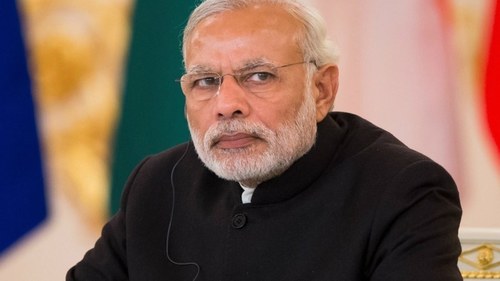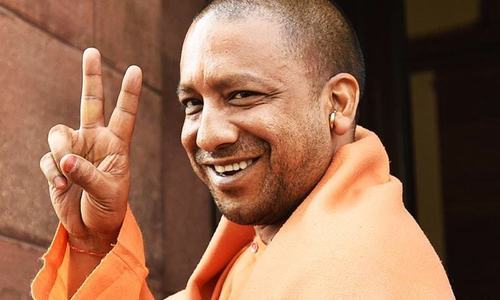
“HE would make a drum out of the skin of his own mother in order to sound his own praises.” Winston Churchill was taking a celebrated shy here at his arch rival Lloyd George to everyone’s mirth. How would the humour work in India?
Hindutva cohorts spent most of the 10 years of prime minister Manmohan Singh’s years in office hurling abuses at him, calling him a thief and even a eunuch. The gentleman that he was, Singh responded with studied silence, eyes lowered. Now try critiquing Hindutva.
Last week, the police in Kanpur arrested one person and booked 22 others for putting up posters that likened Prime Minister Modi to North Korean leader Kim Jong-un. The posters featured photos of the two leaders side by side with an accompanying Hindi text: “Kim has decided to destroy the world, Modi has decided to destroy business.”
The traders missed a more telling point, however. India under Modi has slipped in the world hunger ratings to a level below North Korea. And both claim to be muscular nuclear powers that won’t baulk at the idea of using their arsenal against a challenger.
According to The Hindu, an FIR was filed against the 22 traders named on the posters under Sections 505 (statements conducing to public mischief) and 153 (wantonly giving provocation with intent to cause riot) of the Indian Penal Code.
The threat Hindu extremists pose is by no means limited to their abusive tongue.
Indeed, people who lampoon Modi or his aide Amit Shah, not to forget their handpicked Uttar Pradesh Chief Minister Yogi Adityanath, face a real danger at the very least of being abused on social media by their strangely virile followers. If the critic is a woman — and women happen to lead the spiralling chorus against the regime — she can expect to be threatened with rape. In case the indignant critic is male, he would have to endure the choice of his sister or mother being threatened with sexual assault.
In both events, it is the woman that ends up as the eventual victim of Hindutva’s rage. On a lean day, the critics can be arrested or served with a legal notice, as was the case with the traders or like a certain movie actor in southern India who ribbed Modi. Elsewhere, they can be bashed up by an irate mob, often under the watch of indulgent policemen.
Everyone abuses everybody in a world where regional, linguistic, religious or tribal prejudices abound. In India, the caste system has spawned its own vocabulary. Elite Muslims, mostly comprising the ashraaf, share the cultivated litany of caste-based abuses with their elite Hindu allies. Contemptuously calling someone a cobbler or a toilet cleaner, forbidden under Indian law, has been a cultural trait of Hindus and Muslims alike.
Of course, the upper castes are cursed back in turn, and that is the inevitable equaliser. Najman Bua of Rudauli had her peasant response in a rage. She was the Muslim house help who raised me as a child. Her choicest abuse was to call someone an offspring of a bearded Turkish rapist, reference to marauding soldiers.
As a convent-educated girl turned away her face in the old Bombay bus because a sweat-soaked fisherwoman had just found a seat next to her, what was the earful she got from the fish vendor? “Thaavk hai ga, moti baamna chi poar haais ti.” (I know you are a Brahmin’s daughter, and so what!)
Muslims mask their own peculiar genre of perverse talent. When the lights would go off at the Aligarh Muslim University hostels — and the problem of power outrages was perennial in the 1970s — the ashraaf Muslims, mostly those who would be teaching the path of piety to the newcomers during the day, would resort to the foulest invectives they mindlessly hurled at the inmates of a rival hostel in the cover of darkness. Women were again the targets.
The advent of the parliament house of elected deputies, initially under upper-caste sway, put a period of restraint on the style and substance of the conversations in Indian politics. My guess is that the rise of the Shiv Sena in Maharashtra ended the period of mandatory sobriety. The caste verbiage mutated into a ‘dhikkar (fie on you) rally’ by the Dalit Bahujan Samaj Party in Uttar Pradesh. The middle caste Samajwadi Party returned the compliment with a ‘thoo thoo (spit on you) rally’ against the Dalits, recalling perhaps that the lowest in the caste heap had to wear a spittoon round their neck so as not to pollute the path of walkers.
As the two tramps in Samuel Beckett’s play Waiting for Godot abused each other into an absurd crescendo the bout ended with Estragon calling Vladimir a ‘critic’.
But fascists would not be fascists if they limited their response to criticism with criticism. The threat Hindu extremists pose is by no means limited to their abusive tongue. That is where leaders like Rahul Gandhi miss the point. He personalises everything wrong with Hindutva. He says they routinely abuse him and his family, which is a fact. I have heard activists of Jan Sangh, an earlier avatar of the Bharatiya Janata Party, targeting Indira Gandhi for her gender.
True, they bashed up Rahul Gandhi, metaphorically of course, so much that it made him open his eyes to the real world. Gandhi’s speechwriters seem to accord little space to violence that ordinary Indians face at the hands of fascist vigilantes. They desist from mentioning the daylight murders of men and women like Gauri Lankesh and Malleshappa Madivalappa Kalburgi by suspected Hindutva assassins. For that he deserves to be called an opportunist. In which case, however, rest assured that his henchmen, if he keeps any, will not beat you up or lynch you. And that small blessing may be something to covet in 2019.
The writer is Dawn’s correspondent in Delhi.
Published in Dawn, October 17th, 2017














































